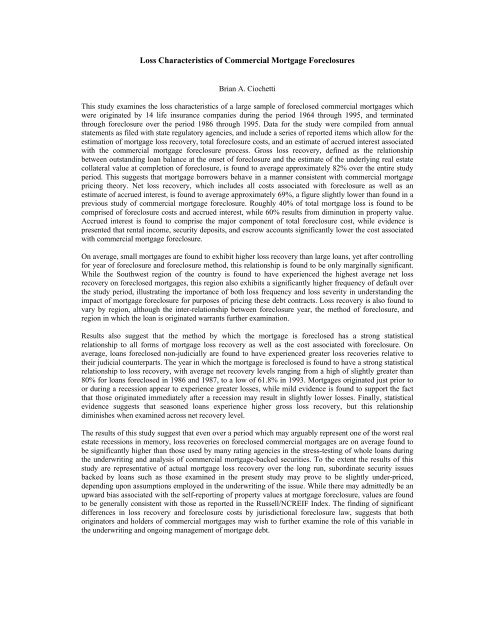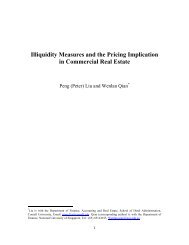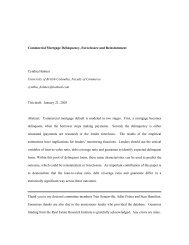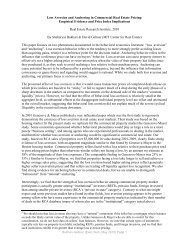Loss Characteristics of Commercial Mortgage Foreclosures
Loss Characteristics of Commercial Mortgage Foreclosures
Loss Characteristics of Commercial Mortgage Foreclosures
Create successful ePaper yourself
Turn your PDF publications into a flip-book with our unique Google optimized e-Paper software.
<strong>Loss</strong> <strong>Characteristics</strong> <strong>of</strong> <strong>Commercial</strong> <strong>Mortgage</strong> <strong>Foreclosures</strong>Brian A. CiochettiThis study examines the loss characteristics <strong>of</strong> a large sample <strong>of</strong> foreclosed commercial mortgages whichwere originated by 14 life insurance companies during the period 1964 through 1995, and terminatedthrough foreclosure over the period 1986 through 1995. Data for the study were compiled from annualstatements as filed with state regulatory agencies, and include a series <strong>of</strong> reported items which allow for theestimation <strong>of</strong> mortgage loss recovery, total foreclosure costs, and an estimate <strong>of</strong> accrued interest associatedwith the commercial mortgage foreclosure process. Gross loss recovery, defined as the relationshipbetween outstanding loan balance at the onset <strong>of</strong> foreclosure and the estimate <strong>of</strong> the underlying real estatecollateral value at completion <strong>of</strong> foreclosure, is found to average approximately 82% over the entire studyperiod. This suggests that mortgage borrowers behave in a manner consistent with commercial mortgagepricing theory. Net loss recovery, which includes all costs associated with foreclosure as well as anestimate <strong>of</strong> accrued interest, is found to average approximately 69%, a figure slightly lower than found in aprevious study <strong>of</strong> commercial mortgage foreclosure. Roughly 40% <strong>of</strong> total mortgage loss is found to becomprised <strong>of</strong> foreclosure costs and accrued interest, while 60% results from diminution in property value.Accrued interest is found to comprise the major component <strong>of</strong> total foreclosure cost, while evidence ispresented that rental income, security deposits, and escrow accounts significantly lower the cost associatedwith commercial mortgage foreclosure.On average, small mortgages are found to exhibit higher loss recovery than large loans, yet after controllingfor year <strong>of</strong> foreclosure and foreclosure method, this relationship is found to be only marginally significant.While the Southwest region <strong>of</strong> the country is found to have experienced the highest average net lossrecovery on foreclosed mortgages, this region also exhibits a significantly higher frequency <strong>of</strong> default overthe study period, illustrating the importance <strong>of</strong> both loss frequency and loss severity in understanding theimpact <strong>of</strong> mortgage foreclosure for purposes <strong>of</strong> pricing these debt contracts. <strong>Loss</strong> recovery is also found tovary by region, although the inter-relationship between foreclosure year, the method <strong>of</strong> foreclosure, andregion in which the loan is originated warrants further examination.Results also suggest that the method by which the mortgage is foreclosed has a strong statisticalrelationship to all forms <strong>of</strong> mortgage loss recovery as well as the cost associated with foreclosure. Onaverage, loans foreclosed non-judicially are found to have experienced greater loss recoveries relative totheir judicial counterparts. The year in which the mortgage is foreclosed is found to have a strong statisticalrelationship to loss recovery, with average net recovery levels ranging from a high <strong>of</strong> slightly greater than80% for loans foreclosed in 1986 and 1987, to a low <strong>of</strong> 61.8% in 1993. <strong>Mortgage</strong>s originated just prior toor during a recession appear to experience greater losses, while mild evidence is found to support the factthat those originated immediately after a recession may result in slightly lower losses. Finally, statisticalevidence suggests that seasoned loans experience higher gross loss recovery, but this relationshipdiminishes when examined across net recovery level.The results <strong>of</strong> this study suggest that even over a period which may arguably represent one <strong>of</strong> the worst realestate recessions in memory, loss recoveries on foreclosed commercial mortgages are on average found tobe significantly higher than those used by many rating agencies in the stress-testing <strong>of</strong> whole loans duringthe underwriting and analysis <strong>of</strong> commercial mortgage-backed securities. To the extent the results <strong>of</strong> thisstudy are representative <strong>of</strong> actual mortgage loss recovery over the long run, subordinate security issuesbacked by loans such as those examined in the present study may prove to be slightly under-priced,depending upon assumptions employed in the underwriting <strong>of</strong> the issue. While there may admittedly be anupward bias associated with the self-reporting <strong>of</strong> property values at mortgage foreclosure, values are foundto be generally consistent with those as reported in the Russell/NCREIF Index. The finding <strong>of</strong> significantdifferences in loss recovery and foreclosure costs by jurisdictional foreclosure law, suggests that bothoriginators and holders <strong>of</strong> commercial mortgages may wish to further examine the role <strong>of</strong> this variable inthe underwriting and ongoing management <strong>of</strong> mortgage debt.
Future research on the loss characteristics associated with commercial mortgage foreclosure will continueto be limited until such time as mortgage-specific data become more readily available. The present study islimited in the level <strong>of</strong> analysis which may be conducted, as loan-specific underwriting characteristics whichwould allow for precise estimation <strong>of</strong> foreclosure time period, estimates <strong>of</strong> accrued interest, and mostimportantly, the overall yield impact <strong>of</strong> mortgage foreclosure are not available. Yet, given the recentimprovement in real property markets, and the increased level <strong>of</strong> interest in both the origination andsecuritization <strong>of</strong> commercial mortgages, a need clearly exists for continued research on the credit-relatedperformance <strong>of</strong> these assets.





